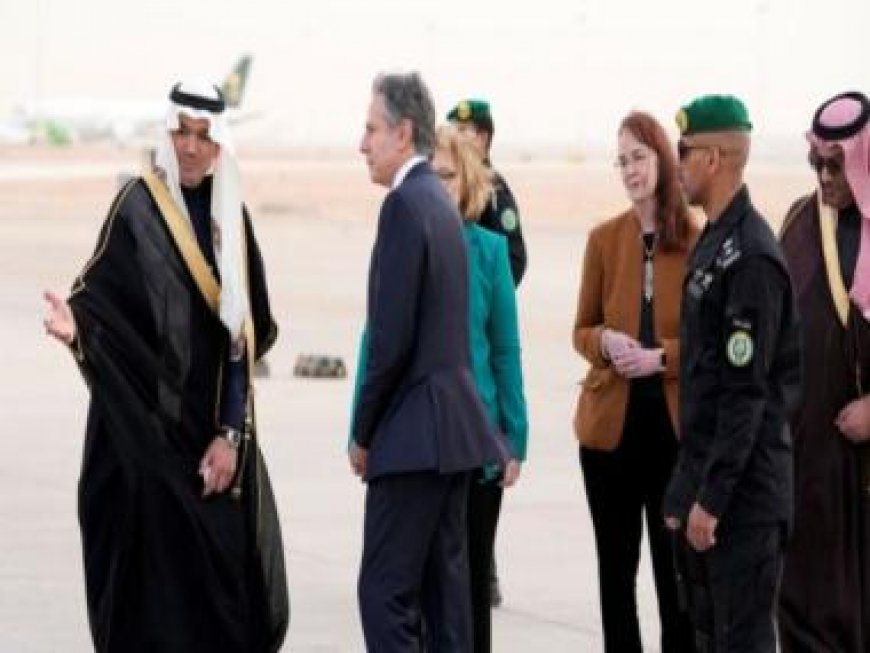Anthony Blinken meets Saudi Arabia's crown prince Mohammed bin Salman amid West Asia tensions
Anthony Blinken meets Saudi Arabia's crown prince Mohammed bin Salman amid West Asia tensions

On Monday, U.S. Secretary of State Antony Blinken touched down in Saudi Arabia, the first stop on a Middle East tour, as Washington attempts to push forward with discussions on post-war Gaza governance and a normalization agreement between the kingdom and Israel.
In reaction to a drone strike in Jordan last week that left three American troops dead and numerous others injured, the top U.S. ambassador is making his fifth trip to the region since Hamas’ deadly attack on October 7. The visit coincides with retaliatory U.S. strikes on militias backed by Iran throughout Syria, Iraq, and Yemen.
In an effort to forward the negotiations with Hamas mediated by Egypt and Qatar in hopes of reaching a hostage agreement, Blinken is also scheduled to go to Egypt, Qatar, and Israel this week.
According to a U.S. official, Blinken met with Saudi Arabia’s foreign minister, Prince Faisal bin Farhan Al Saud, and the de facto ruler of the country, Crown Prince Mohammed bin Salman, in Riyadh.
The seasoned diplomat’s most recent journey takes place during what top American officials characterize as one of the riskiest periods in the region’s history. As Houthis from Yemen have attacked Red Sea commerce routes, and militias backed by Iran have joined the fight and opened fire on American forces in Iraq and Syria, the violence has intensified.
Despite this, Blinken will make an effort to reaffirm that the Biden administration does not wish for war with Iran or for the situation to worsen.
According to a senior U.S. official briefing reporters en route to Riyadh, the secretary’s top aim is to “deliver a message directly to countries in the region that the United States does not want to see the conflict escalated and will not escalate the conflict.” “It’s crucial to be present and express it one-on-one.”
Although Iran supports those militia groups, it has refrained from taking a direct part in the fighting thus far. Despite opposition from Republicans in Congress, some of whom have called for assaults inside Iran, the Biden administration has publicly said that it does not want conflict with Iran. Additionally, the Pentagon stated that it does not think Tehran desires war.
On Sunday, White House national security advisor Jake Sullivan declined to comment on the possibility that American forces may strike targets inside Iran. Although he did not envisage a wider war, he said Washington would not back down in the event of an attack.
The American campaign of reprisal, which has been going on since Friday, has no right to stop Washington from talking to Israel and the Arab governments about normalization and post-war Gaza.
There are currently over 130 hostages in Gaza; one topic being discussed in talks mediated by Qatar and Egypt with US support is the possibility of Hamas releasing them in exchange for a humanitarian break. Although there has been significant improvement, officials have warned that there are still gaps.
Discussions on a normalization agreement between Saudi Arabia and Israel, which had been put on hold in the immediate wake of October 7 but had picked back up in recent weeks, are now seen as being greatly aided by the hostage situation and the humanitarian halt.
According to the U.S. official, discussions about who would lead Gaza after the conflict, how the Palestinian Authority needs to be changed to be able to govern the enclave, and how to secure security guarantees for Israel are now important components of the same equation. He also mentioned that in order to achieve the desired outcomes, Israelis and Palestinians would need to make concessions.
Regarding the establishment of an independent Palestinian state, Israeli Prime Minister Benjamin Netanyahu has expressed disagreement with the Biden administration, stating that he would not give up on “full Israeli security control of all territory west of the Jordan River.” The U.S. official continued, “The talks are at a sensitive phase and any progress will come easily.”
(With agency inputs)
What's Your Reaction?



























































